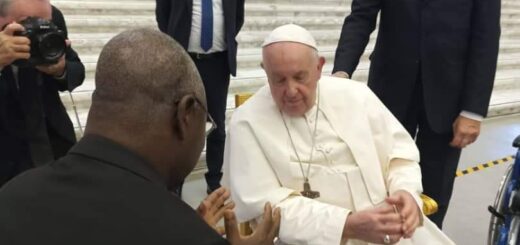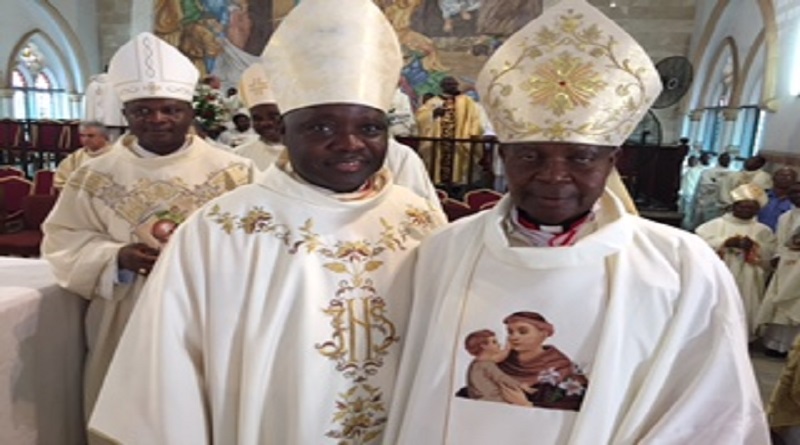ALL MY SPRINGS ARE IN YOU
by ARCH BISHOP · September 5, 2021
“ALL MY SPRINGS ARE IN YOU” – A Reflection on the International Eucharistic Congress, Budapest Hungary, 5th – 12th September 2021
The 52nd International Eucharistic Congress which was postponed last year due to the COVID-19 Pandemic, held from 5th to 12th September, 2021, in Budapest, Hungary. With the theme, “All my springs are in you” (Psalm 87:7), it was a very fruitful Congress of amazing graces. Spiritually uplifting and edifying, it was also an auspicious moment of prayer for healing for our wounded world and a bleeding humanity.
Participants from all over the world were welcomed warmly by His Eminence, Cardinal Peter Erdõ, Archbishop of Esztergom-Budapest and Primate of Hungary, in the opening Mass at the Heroes’ Square, officiated by Cardinal Angelo Bagnasco, President of the Council of European Bishops’ Conferences. At the Holy Mass, one thousand two hundred immaculately dressed children solemnly received their first communion.
I was impressed by the enthusiastic participation of pilgrims: their recollected and prayerful participation at Masses, the sacrament of reconciliation, youth and family programmes, etc. At the St. Stephen’s Basilica, youths and adults in their numbers joined in the over two hours of solemn adoration of the Lord in the Blessed Sacrament, with an excellent choir of forty and the orchestra of twenty five musicians singing very lively hymns of Eucharistic adoration. The Eucharistic Candle procession from the Parliament to the Heroes’ Square after the Saturday 11th September Mass was simply beautiful, and a clear demonstration of Eucharistic faith.
During the Congress, testimonies, catechesis, and talks were given by speakers from Hungary, USA, India, Brazil, France, Nigeria, Ukraine, Italy, Cameroun, Romania, UK, Canada, Baghdad, Philippines, Germany, Belgium, Poland, Myanmar, Spain, Slovakia, Ecuador, Czech Republic, Luxembourg, Croatia, Venezuela, South Korea and others.
The Byzantine Divine Liturgy in St. Stephen’s Basilica, attended by many Bishops and priests of both Catholic Western and Eastern rites was solemn and beautiful.
The Congress afforded us the opportunity to celebrate the beauty of the Eucharist as the source, centre and summit of our life as Catholics. The Eucharist nourishes, heals and binds us and can be a remedy for a world that suffers a deficiency of moral values, allowing despair to displace hope, and some people trying hard to suppress the presence of God and drown His voice or pretend to teach, advise and reprimand God, because they believe in their “scientific progress”.
We were informed that the President of the Republic of Hungary, János Áder, chaired the social committee tasked with preparing the international Eucharistic Congress. His testimony on the 10th of September, shared with pilgrims at the Hungexpo Congress Centre was inspiring and edifying. As author of the book, “Looking to the Sky: God’s Presence in Hungarian Poetry”, the President no doubt, shows that he is a leader who combines politics with genuine spirituality. It was inspiring to see him well-seated with the Deputy Prime Minister and other Government officials over one hour before the commencement of the Saturday Mass as well as the closing Mass of the Holy Father on Sunday. It says a lot about the President’s spiritual disposition. No wonder, in his testimony he said among other things that “searching for God means active faithfulness”, and he counseled that all should use their talents given by the Lord, whole-heartedly.
I was equally impressed by the emphatic assertion of the Deputy Prime Minister of Hungary, Mr. Zsolt Semjén, while addressing participants at the Hungarian National Museum that he is a Christian, and said repeatedly that Hungary is a Christian country; with it’s culture and traditions rooted in Christian civilization, and that Hungary will continue to defend and support Christians who are being persecuted for their faith.
Cardinal Louis Raphael Sako, Archbishop of Baghdad, Catholic Patriarch of Babylon of the Chaldeans (Iraq), expressed a similar sentiment when he said in his testimony about Christians in Iraq that, “We are not ashamed to say we are Christians.”
The beauty of Hungary is not only in the wonderful historical and geographical landmarks, but that despite the 150-year attempt to eclipse their culture and Christian faith, Hungary has not allowed its culture and traditions to be uprooted from Christianity. They are happily a Christian nation and gladly say so.
How one wishes that other countries whose civilization was very greatly influenced by Christianity will be able to say with the same clarity and categorical conviction that God is numero uno, and because of their Christian roots, they owe it a duty to promote Godly values when making social, political, and ethical policies and decisions.
One cannot but appreciate the many volunteers (young ladies, young men, adult men and women, Mass servers, scouts, workers, etc) who warmly and charmingly welcomed us to their beautiful land, and went the extra mile to make our stay stress free. The first Hungarian word I learnt is “koszonom” – “thank you”. To our excellent Hungarian hosts, we say, “koszonom”.
Immense gratitude to the Holy Father, Pope Francis, who presided at the concluding Mass of the Congress and his words encouraging us to know and love Jesus more dearly and by His grace, to transform humanity, bedeviled by the pandemic of fear, anxiety, violence and indifference. We are grateful that the Holy Father has permitted that the next International Eucharistic Congress in 2024 will hold in Ecuador, by God’s grace.
The presence and the address of His Holiness Bartholomew 1, Ecumenical Patriarch of Constantinople on Saturday, prior to the Holy Mass in front of the Hungarian parliament, attended by ecclesiastical and state dignitaries, was a good gesture of ecclesiastical fraternity. He called on recipients of the Eucharist to continue the liturgy after the liturgy; to offer witness and to share God’s gifts with all mankind. “Nothing”, he said “is more truly catholic than the Eucharist.” He concluded that our life as Christians should be a life of applied ecology and applied solidarity; and that our world today is need of a united Christianity.
The Eucharistic Congress left me with a firmer conviction that Jesus blesses us and shows us mercy in the Eucharist. It is a Eucharistic imperative that we all become sincerely rooted in God and transformed into loving and peaceful human beings without artificial boundaries or barriers.




